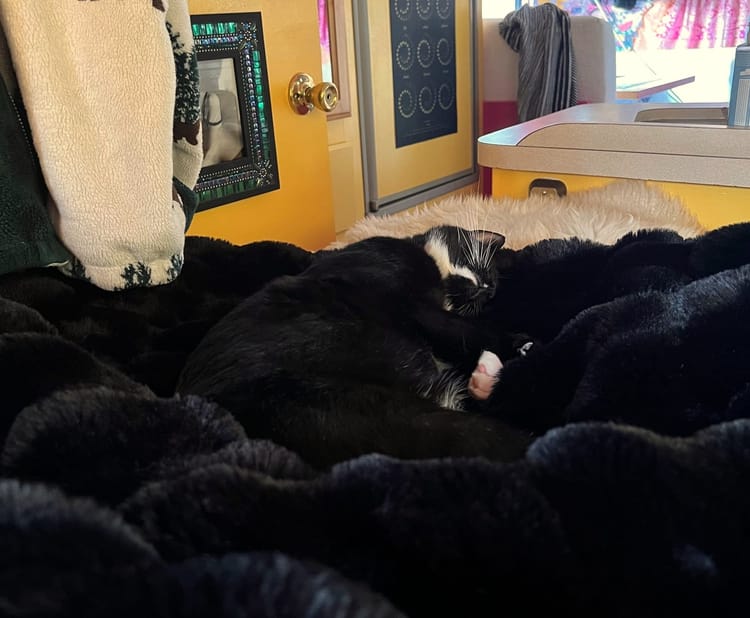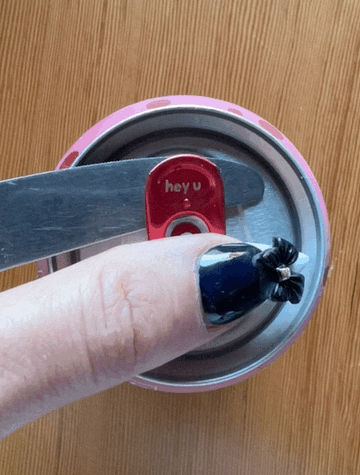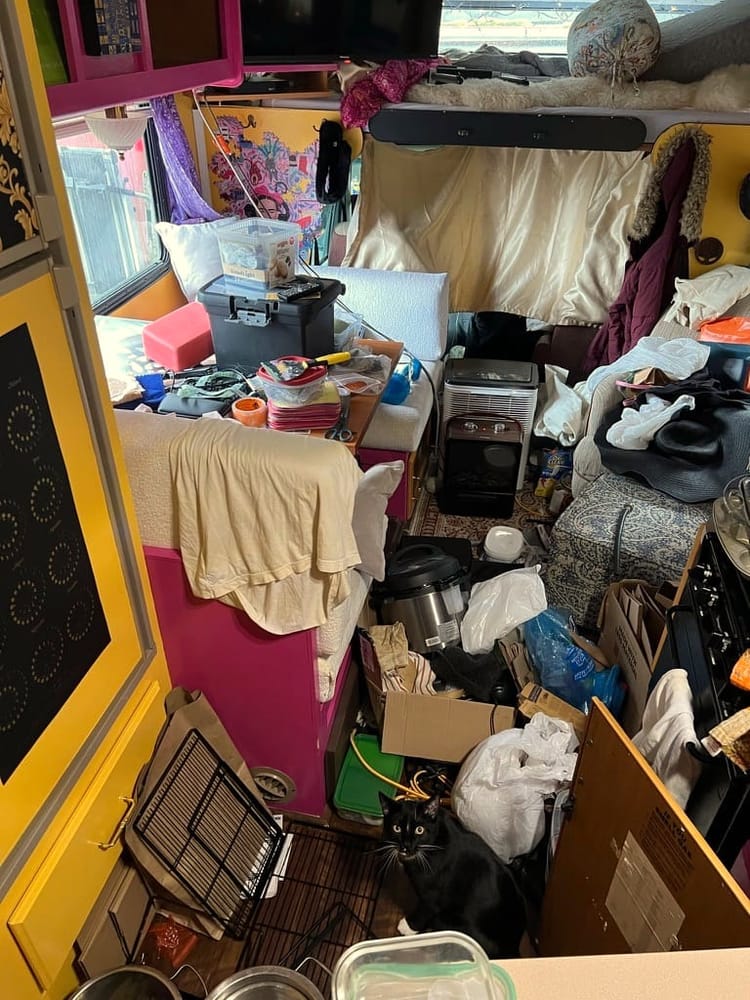Faggot-Witch Forever: A Letter of Resignation to Cis Publishing
In January, the Times of London magazine fired me for refusing to let them take half-naked pictures of my trans body.
For a nearly infinite number of reasons, the demand that I be photographed in my underwear or else a news magazine would pull a story—and the accompanying rent money—I’d put weeks of edits and conversations and considerations into was beyond fucked. After all the copy had already been agreed on, the editor told me just hours before the associated photo shoot that I’d need to take off my pants. When I countered, appalled, that I would wear shorts, the editor said that the Times would need prior, photographic proof sent immediately of the shortness of said shorts, and that even if the Times approved said shorts as short enough, I would at the very least still have to take off my shirt.
As horrifically as I had been objectified before transitioning—yes, including at work—it’s difficult for me to imagine this conversation happening when people thought I was female. We’re very excited to have your award-winning voice in our journalism publication—but we will kill your story without photos of you in your panties. The photos I’d taken in my underwear for another magazine, wholly at my own behest in that case, weren’t available for license, and that wasn’t a trick I performed on command. I told the Times that I still intended to deliver impactful images. I told them that their demand was exploitative—I had no illusions, from the moment they’d asked to reprint my feature about phalloplasty (available free here), that they weren’t after the frenzy the piece would incite in Britain’s virulently transphobic media. But that didn’t have anything to do with me and my getting to say—and getting paid to say—in said media, “You don’t need a penis to be a man. And a vagina does not make a woman.”
Until it did.
I was in shock. I was enraged—was it even legal in the UK to tell a person, to tell a trans person, that they had to disrobe on camera to be paid? But because the world has worked hard to make me feel like I don’t deserve rights or respect, my feelings got caught in a tangle of internalized blame: What did I think was going to happen? A cascade of old stories and terrors came with the end of the getting-fired phone call. You’ll never be able to support yourself. Not in a trans body, not in a cis world. Not without doing things you don’t want to do. They were accompanied by the desperate anxiety of trying to figure out how to protect myself from getting hurt again. Should I stop working for magazines entirely, where I’ve built my career over the last 15 years? Cancel the other outstanding feature assignments I already had because there is always, inevitably now, an element of dehumanization built into completing them? Start demanding hazard pay? How much would be enough for being told that I wasn’t going to get paid for weeks of work on a story that took a lifetime to create unless I provided fresh deminudes of my trans body for British people to gawk at? Not even a million dollars. What they’d offered me was twenty-five hundred. Ultimately, because I wouldn’t throw in free panty pics, they paid me zero.
Out of what began as necessity, an adaptation to childhood trauma, I’ve had a lifelong practice of trying to drag people toward their own self-actualization. Boyfriend or boss emotionally abusive or immature or in need of about 15 years of therapy? Totally unequipped to treat me like a sovereign human worthy of respect? Yeah, I could take that on. Get in that bed. Sign that contract. Say that vow. I could get them there, I could wait it out, I could endure it, however much time it was between today and whenever they could stop harming me. Before I started working for magazines, I used to do writing like this: I wrote because I wanted to, because words were moving through me and my fingers wanted to render them in black and white, because my internal alchemy runs on combining language and emotion into prose.
Then I would show it to some people I liked.
The second I got a job writing at a magazine, I wrote, or else my boss would send mean emails.
No one’s going to love you anymore. That story comes up at the prospect of being honest, scared of complaining as a trans person, which, I can feel, makes even old cis friends uncomfortable though they were happy to listen to me yell for hours as a supposed woman before. I’m scared of not having success in legacy media to continually validate my existence. As a child sex abuse and trafficking survivor, I’d have done anything as an adult to feel worth something, and let me tell you that that being a magazine writer is one hell of a shortcut. I can’t think of a single time in the last decade and a half that I answered someone’s What do you do? with the truth that magazines pay me money when it didn't result in that person being impressed. It was often backhanded: When I looked like a woman, no matter the gender of the asker, the answer also evoked a skeptical sort of Really?, which they sometimes said right out loud. Now that I read as a man, the response is generally, “Wow!”, and I’d be lying if I denied that was what I was going for. I’d entered traditional publishing in my twenties so I could make the connections necessary to publish a book about friends who were refugees, but even an intern’s role garnered me a reverence that was wholly unfamiliar—and for which I was starving. I realize now how desperately I needed it, and how dependent on it I became. Once I started transitioning and being treated as a hated and devalued minority in ways I’d gleefully avoided living cis white life, I needed it more than ever.
No one’s going to love you anymore, says the internalization of all those voices saying I need to prove that I’m worthy, that I’m only worthy if I’m a successful professional human—that I have to be successful to be counted as human at all. It compels me to continue playing nice enough with editors to keep the mantle of a professional in an industry that has long demeaned and excluded my kind. It’s the voice of the voracious internal overachiever that drove me up a cliff-steep career trajectory from zero college journalism classes to standing on a national magazine cover (yes, in my underwear) last winter alongside some 6,500 of my own most honest words.
Until they weren’t. After the photographer for that shoot misgendered me relentlessly (if very apologetically) all day long, I wrote it frankly (if not unkindly) into the story—and then spent hours—hours—in conversation with three high-level editors to advocate for the right to keep it in. One said that I didn’t understand the sacred bond of nondisclosure between photographers and subjects—and explained at length, as if I have never heard or thought about it before, that pronouns are hard. Another said that this kind of public laundry airing was beneath a certain standard of class, and might start something ugly online. People wanted to look at beautiful powerful pictures of me, I was told, and talking about a sad thing that happened in said pictures’ production took away from that. No one asked me what I needed, which was to be allowed to acknowledge what had happened. Everyone told me that I had to do what the very sorry photographer and editors needed, which was to pretend that it hadn’t.
Ultimately, the paragraph stayed in, but was edited for me. I did request hazard pay, not even for all the misgendering and patient correcting and coddling I did for the photographer on set—it was, he announced to the crew when I tried to explain how it hurt, painful for him when he misgendered me, too—but for the editors’ subsequently turning it around on me that I, in writing about it, was doing being harmed wrong by trying to bring it into the light. I said that the magazine should add at least one therapy session’s worth of support to my fee. In response, the editor I said it to laughed.
I genuinely like that person. Multiple of the aforementioned people. My intention is not to damn but to describe. I’ve scanned the above paragraph forty times for judgmental words. But any events, when I’m the one who writes them, have the potential to make me sound emotionally dysregulated, which is the cultural baseline status of The Trans: batshit, Buffalo Bill. I was the supposedly unreasonable one at the same time that I was being tasked with 1. managing the emotional responses several adult editors were having (“scared,” “devastated,” “pissed,” “about to throw up”) to my trying to talk about a thing that happened to me, 2. absolving and keeping secrets for a celebrity photographer, 3. protecting him from feelings he or anyone else might have about his misgendering me, 4. protecting readers from having to think about how a happy-looking slim white trans guy’s life might still not be perfect when they’re just trying to enjoy some nice half-naked pictures, and 5. protecting a multimillion-dollar media property from any possible negative reactions of the entire internet, all while 6. processing (quietly, please!) the event itself: standing in my own home, and later in a studio, in front of a man who kept calling me a woman, correcting him myself over and over, while his whole crew watched and said nothing.
It was not, I realized with sadness on a walk a few weeks later, taking frank inventory of what it’d paid versus what it had cost, worth it.
It’s with much greater sadness that I am still only beginning to acknowledge how long that’s been true of my career. Even before I started transitioning, the very first (of many) psychedelic therapy sessions I did uncovered internal pleas to quit my job, a deep wisdom (I ignored) to remove myself from an industry where an editor at the magazine of the paper of record once told me that they “want[ed] to put a moratorium on the subject” of “trans stuff.” Then sure enough, the moment I came out, an editor at Allure I’d worked with one time called me late, too late, one night to tell me that sometimes he’d watch gay porn with trans guys “you’d never know were trans because they look just like normal guys—until they take their pants off!” When that same editor called me even later another night, while I was standing on a sidewalk trying to have a conversation and a life, a sick feeling sank into my stomach. When a lecturer at so-woke UC Berkeley’s Graduate School of Journalism, where my work has been taught in multiple classes, invited me to come talk to her students, I arrived to her complaining—to me—that a staff bathroom had been turned into a gender neutral bathroom; before I went to address her class for an hour for free, she said the last time I’d done this service I’d struck her as “just an angry person,” but now that she knew I was trans that “made sense.” After the New York Times Magazine’s “moratorium” was evidently lifted, the editor reached out to offer me a profile assignment—of a famous trans person—and I addressed the former incident. She apologized for the phrasing. The issue, which is that trans people are not a subject, but people, went far beyond phrasing. I told a trans friend who works as far from the magazine industry as imaginable about the exchange, and when I brought it up many months later saying I wasn’t sure if he remembered it, he said, quietly, “Yeah. I still think about that all the time.”
I turned down the assignment, because I felt the chance that the editor wasn’t going to inadvertently degrade me in the course of editing my trans-ass draft about a trans director was slim. The general understanding among the liberal cis population seems to be that if you know you’re not supposed to say bad things about trans people and maybe even know some and “support” (absolutely passively, of course) their right to exist, you are an ally. In fact, transphobic and anti-trans bias courses through the veins of every socialized human on this planet. It requires active recognition and deep, evolving work to address, just like sexism and racism do. I have so far met two cis people who I felt fully acknowledged this. Neither of them happens to own a magazine empire.
But I also turned down the assignment because it wasn’t ultimately what I wanted to put my time and effort into. Last year, I turned in a book I’d sold to Random House (you should see how that contract impresses and enamors anyone who hears about it). Months before, I’d started asking my editor to call their in-house counsel before I bothered doing too much work because I was concerned they wouldn’t let me say what I wanted to say, which was the truth: that my father raped me when I was a child. Even though the proposal they bought explicitly featured that topic, and though before they bought it the editor and I talked specifically about how terrible it was that I’d been censored from talking about it by Conde Nast, the lawyer said just what I’d feared.
They wouldn’t print it unless I could prove it.
I offered to put a disclaimer that the rapist denied the allegations on every single page of the printed book, even ones that didn’t mention him. It wasn’t enough. In one of the long conversations we had about what counted as adequate proof, as my own testimony and that of four unrelated, independent therapists I’d spent hundreds of hours in (non-psychedelic, to be clear) treatment with didn’t, the lawyer gave the example of several other on-the-record victims. In a subsequent conversation, a number of other victims she threw out as an example of being enough was seventeen.
“How do you know it was your dad?” she asked me in the same conversation.
I killed the contract. A Random House letter has since demanded I repay the part of my advance they gave me years ago to work on a book I turned in, rather than offering to pay the rest of my advance for being unwilling to publish it uncensored. People can shake their heads about child sex abuse and talk about what a shame it is, but it’s not a shame. It’s our collective shame, and in my opinion it’s unconscionable for the world’s largest publisher to choose, despite having house counsel, more than four billion dollars in revenue, and liability insurance, to not talk about it. To require me to actively participate in the near-total establishment silencing of incest survivors is demented.
Recently, I turned down an assignment from another magazine. It was a good story; it was free travel and a paycheck. But the top editor had exhibited trans illiteracy and tokenism, and I am finally no longer in denial that I’m unable to navigate cis media without harm. As we were negotiating word counts and fees, my therapist asked me how much they’d have to pay to make whatever was going to unfold next worth it. Double? he suggested. They wouldn’t have paid me double. And I had to admit to myself that there wasn’t a number anymore.
I wrote the story anyway. (It was my idea.) It’s called “Two in the Morning in Budapest,” and the subtitle is “A Gay Trans Psychedelic-Integration White Indigenous Hot-Spring Pilgrimage,” because I contain multitudes—complexities mainstream publishing has never been able to hold. These last few years, it’s made it clear it never will. From the very first sentence, I wrote this story differently than I’d have written it if there was a cis gatekeeper at the path to publication, and I therefore wrote it with unprecedented ease and flow, unshackled from the Cis Agenda, which is fundamentally anti-trans, anti-multicultural, anti-change. Anti-accountability. It’s the first of many features and essays I’ll publish under the banner of another word I wasn’t allowed to say in the phalloplasty piece. After the editors at New York asked me to explain why I kept my vagina when I got my penis, I wrote in the next draft that I was a faggot-witch, and then they told me I couldn’t say that.
“Save it for the book,” an editor said. I saved it for this site. Also saved for this site is another piece I was assigned to write for them, which is a personal essay about my asexuality. “We have a long history of publishing pieces about deviant sexuality,” the assigning editor said when I pitched it, somehow unaware of the brutal context of slinging the word “deviant” at a gay and trans person—or of comparing me to a man who has sex with horses, which is exactly what she did next. I’m hereby resigning from legacy publishing, which has always been an unsafe and stifling place to work. And that was before I started writing about anal fisting.
That’s in another piece, and it too will be available only here, all only by subscription.
No one loves a person with a blog!, that old part of me screams, creature of the undying hustle, unloved fragment that actually knows validation isn’t bestowed through the heft of ink printed on Cis People Paper but was hell-bent on seeking it that way anyway because, having come up breathing the same anti-gay and anti-trans ether as everyone else, and being depersonalized through incessant developmental sexual violence to boot, I couldn’t give it to myself.
I’m sorry, dear one. I’m sorry it took me so long.
It was easy for me to tell myself I deserved poor treatment; I was so practiced at excusing it by hating myself. Finally getting ready to step away from the cycle, I was making my bed recently and suddenly thought, What am I going to do with all this love? All the love constantly manufactured by this sweet trans body. All the love uncoupled from trauma through ungodly (read: super godly) amounts of therapy. I used to pour it, try pouring it, into straight-looking marriages and overtime at respectable jobs and other containers that seem to be the right size and shape for other people. But here I am, now, faggot-witch at your service, and at mine. With faith that what I have to say, and the way I want to say it, has value in and to this world. I hope you’ll join me on this journey. If you read this far, maybe there are some things you want to break open a little bit, too, some things you want to bring into your own light, and I genuinely wonder what.
And I send genuine, trascendental love to them.
You deserve that. And so do I.






Member discussion